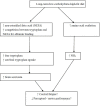Low-Carbohydrate-High-Fat Diet: Can it Help Exercise Performance?
- PMID: 28469746
- PMCID: PMC5384055
- DOI: 10.1515/hukin-2017-0025
Low-Carbohydrate-High-Fat Diet: Can it Help Exercise Performance?
Abstract
Low-carbohydrate-high-fat (LCHF) diets have been used as a means of weight loss and control of symptoms in several clinical conditions. There is emerging evidence that the metabolic changes induced by LCHF diets enhance endurance performance. The aims of this review are to examine the evidence of LCHF diets in improving various aspects of athletic performance. Long-term LCHF dietary intake may help control body weight and fat mass while maintaining lean body mass in athletes in weight-sensitive sports. LCHF-adapted endurance athletes can reach the maximal fat oxidation rate of approximately 1.5 g/min, with a lower carbohydrate oxidation rate and similar muscle glycogen content and a resynthesis rate compared to their counterparts consuming high-carbohydrate-low-fat (HCLF) diets. The elevated fat oxidation rate and glycogen sparing effect may improve performance in ultra-endurance events. These metabolic changes may also prevent the decline in performance in later stages of repeated high-intensity movements, in which the aerobic metabolism becomes more important. However, elevated blood concentrations of non-esterified fatty acids and ammonia during exercise after LCHF diets may lead to early development of central fatigue. It appears that at least several months of adaptation to a LCHF diet are required for the metabolic changes and restoration of muscle glycogen to occur. Further investigations on LCHF diets are needed regarding (1) performance after weight loss in weight-categorized sports; (2) repeated high-intensity exercise performance; (3) development of central fatigue during endurance events; (4) perceptual-motor performance during prolonged intermittent sports; and (5) ideal dietary fatty acid compositions.
Keywords: central fatigue; endurance exercise; ketogenic diet; perceptual-motor performance; repeated high-intensity exercise; substrate metabolism.
Figures
References
-
- Achten J, Jeukendrup AE.. Optimizing fat oxidation through exercise and diet. Nutrition. 2004;20:716–727. - PubMed
-
- Asmussen E.. Muscle fatigue. Med Sci Sports Exerc. 1993;25:411–420. - PubMed
-
- Bishop D, Edge J.. Determinants of repeated-sprint ability in females matched for single-sprint performance. Eur J Appl Physiol. 2006;97:373–379. - PubMed
-
- Brinkworth GD, Buckley JD, Noakes M, Clifton PM, Wilson CJ.. Long-term effects of a very low-carbohydrate diet and a low-fat diet on mood and cognitive function. Arch Intern Med. 2009a;169:1873–1880. - PubMed
-
- Brinkworth GD, Noakes M, Clifton PM, Buckley JD.. Effects of a low carbohydrate weight loss diet on exercise capacity and tolerance in obese subjects. Obesity (Silver Spring) 2009b;17:1916–1923. - PubMed
LinkOut - more resources
Full Text Sources
Other Literature Sources


